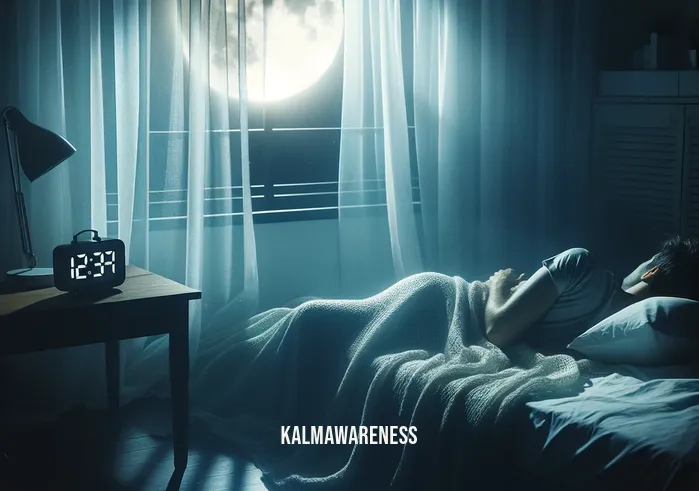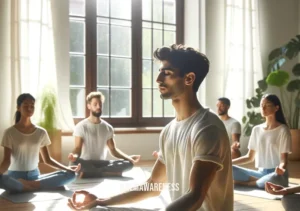Guided Meditation to Fall Asleep Fast: Unveiling the Secrets of Nightly Tranquility
Introduction to Guided Meditation for Sleep
In our fast-paced world, where the hustle and bustle of daily life often invade our night-time thoughts, finding peace and tranquility has become more crucial than ever. Enter the realm of guided meditation to fall asleep fast, a technique that not only promises a swift journey into dreamland but also enhances overall well-being. This comprehensive guide is your first step towards mastering this art, an exploration into the soothing world of meditation designed to help you drift off to sleep effortlessly.
The Science Behind Sleep and Meditation
Understanding the science of sleep is essential in grasping how guided meditation aids in faster and deeper sleep. Sleep, a vital function, is when our body repairs itself, and our brain consolidates memories. However, in the maze of modern life, stress and anxiety can disrupt this natural process, leading to insomnia and sleep disturbances.
Guided meditation introduces a state of relaxed awareness. This technique involves a series of calming visualizations and breathing exercises that ease the mind into a state of relaxation, conducive to sleep. Studies have shown that meditation can effectively reduce stress and anxiety, two major culprits of sleeplessness.
The Role of Mindful Movement in Sleep
Integrating mindful movement into your nighttime routine can significantly enhance the quality of your sleep. Gentle, mindful movements help in releasing physical tension, aligning your body into a state of relaxation essential for falling asleep quickly. These movements, combined with guided meditation, create a holistic approach to prepare both mind and body for sleep.
Different Types of Guided Meditation Techniques
There are several approaches to guided meditation, each offering unique benefits:
- EMDR Meditation: An innovative method, EMDR (Eye Movement Desensitization and Reprocessing) meditation, involves rhythmic eye movements that help in processing and releasing emotional distress, a common barrier to peaceful sleep.
- Breathing Exercises: A fundamental aspect of meditation, focusing on breath helps calm the mind and regulate the nervous system, paving the way for a restful night.
- Mindfulness Meditation: This involves being present in the moment, observing thoughts and sensations without judgment, thus creating a peaceful state of mind ideal for sleep.
- Floating Meditation and Guided Imagery: Techniques like floating meditation use the power of visualization to induce a state of deep relaxation and tranquility.
Preparing Your Mind and Environment for Sleep
Preparing your mind for sleep is as crucial as setting up a sleep-conducive environment. Practices such as clearing energy meditation can be highly effective in creating a mental state conducive to sleep. Additionally, ensuring your sleeping environment is calm, quiet, and comfortable plays a significant role in how quickly you can fall asleep.
The Importance of a Pre-Sleep Routine
Establishing a pre-sleep routine is vital. This can include activities such as reading, light stretching, or hand yoga poses that signal to your body that it’s time to wind down. Integrating meditation into this routine further enhances its effectiveness.
Conclusion and What to Expect Next
In this introduction, we’ve explored the foundational elements of using guided meditation to fall asleep fast. We’ve touched upon the science behind sleep and meditation, various meditation techniques, and the importance of a pre-sleep routine. As you embark on this journey of night-time serenity, remember that patience and consistency are key.
In the next chapter, we delve deeper into the world of guided meditation, exploring specific techniques like EMDR, mindful movement, and the role of mindfulness in achieving restful sleep. Continue reading to unlock more secrets to peaceful nights and rejuvenating sleep.

Exploring the Depths of Guided Meditation for Restful Sleep
Harnessing the Power of Guided Meditation for Swift Slumber
In our journey to understand guided meditation to fall asleep fast, it’s crucial to delve deeper into specific techniques and their benefits. This exploration not only broadens our understanding but also equips us with practical tools to combat insomnia and restless nights. Let’s navigate through various meditation practices, each serving as a unique pathway to tranquil sleep.
Advanced Meditation Techniques for Enhanced Sleep Quality
Guided meditation encompasses a variety of practices, each with its unique flavor and benefits. Here, we outline several advanced techniques:
- Meditation While High: Exploring the concept of meditating while under the influence can be controversial, yet it’s an area worth understanding for its complex dynamics.
- Binaural Beats for Sleep: The use of binaural beats can aid in inducing sleep. Though commonly used for migraine relief, their soothing frequencies can also promote relaxation and sleep.
- Yoga and Meditation for Sleep: Incorporating yoga practices with meditation, especially before bedtime, can significantly improve sleep quality by relaxing the body and calming the mind.
- Sole Focus Meditation: The practice of soles of the feet meditation directs focus to the physical sensations in the feet, grounding the mind and reducing anxious thoughts.
Benefits of Guided Meditation for Sleep
- Reduces Stress and Anxiety: One of the primary benefits of guided meditation is its ability to lower stress levels, a common hindrance to good sleep.
- Improves Sleep Quality: Regular practice leads to deeper and more restorative sleep.
- Enhances Mental Clarity: By clearing the mind of daily worries, meditation prepares the mind for a peaceful night’s sleep.
- Regulates Sleep Patterns: Over time, meditation can help regulate erratic sleep patterns, leading to a more consistent sleep schedule.
Comparative Analysis: Different Meditation Techniques for Sleep
| Technique | Focus Area | Benefits for Sleep |
|---|---|---|
| EMDR Meditation | Emotional Processing | Reduces anxiety and stress |
| Breathing Exercises | Relaxation | Slows down heart rate, preparing for sleep |
| Mindfulness Meditation | Awareness | Calms the mind, enhances sleep quality |
| Guided Imagery | Visualization | Eases the mind into a state of tranquility |
| Yoga and Meditation | Physical Relaxation | Relieves physical tension, promotes sleep |
The Impact of Environment and Lifestyle on Meditation Practices
The effectiveness of guided meditation in fostering fast sleep is also influenced by environmental factors and lifestyle choices. Ensuring a tranquil and comfortable sleeping environment, alongside a healthy lifestyle, can significantly enhance the benefits of meditation. Practices such as avoiding caffeine before bed and maintaining a consistent sleep schedule complement meditation techniques in promoting better sleep.
Preparing for the Next Chapter in Our Meditation Journey
As we conclude this chapter, we’ve expanded our knowledge of various guided meditation techniques and their specific roles in enhancing sleep quality. We’ve also recognized the importance of a conducive environment and healthy habits in maximizing the benefits of meditation for sleep.
In the upcoming chapter, we will explore the practical application of these techniques. We’ll provide step-by-step guides and tips on how to integrate these practices into your nightly routine effectively. Stay with us as we continue to unravel the transformative power of guided meditation for a restful and rejuvenating sleep experience. Continue reading to discover practical tips and insights that will enhance your journey towards peaceful nights.

The Journey of Tranquility: Inspirational Pathways in Guided Meditation for Sleep
The Power of Hope in Guided Sleep Meditation
In our continuing exploration of guided meditation to fall asleep fast, this chapter delves into the heartening world of inspiration and hope. Through real-life stories and motivational quotes, we see how guided meditation isn’t just a tool for sleep but a beacon of tranquility in the chaos of life. Let’s uncover the profound impact of this practice on individuals and the collective spirit of those seeking restful nights.
Transformative Stories: Real-life Inspirations
The journey of guided meditation is marked by countless stories of transformation and rejuvenation. Consider the tale of a chronic insomniac who found solace in the calming waves of floating meditation, finally embracing the gift of restful sleep. Or the individual who overcame anxiety through the practice of anxiety attack meditation, discovering a serene pathway to slumber.
The Role of Meditation in ADHD Management
Another inspiring example is the use of guided meditation in managing ADHD. The mindfulness prescription for adult ADHD demonstrates how consistent practice can bring a sense of calm and focus, easing the journey to sleep for those with hyperactive minds.
Quotes of Hope and Serenity
- “Meditation is not about stopping thoughts, but recognizing that we are more than our thoughts and our feelings.” – A powerful reminder that guided meditation helps transcend daily worries, facilitating a peaceful transition to sleep.
- “Sleep is not a matter of chance, but a matter of choice. It starts with the decision to allow our minds and bodies to rest.” – This quote emphasizes the proactive nature of guided meditation in achieving restful sleep.
- “In the quietude of meditation, we find the sleep we’ve been seeking all along.” – A testament to the effectiveness of kid calm techniques in not just adults but in children struggling with sleep.
Synthesizing Inspiration and Practice
These stories and quotes aren’t just words; they are a testament to the transformative power of guided meditation. They serve as beacons, guiding us through our own journeys towards a peaceful night’s sleep. By incorporating the lessons learned from these examples into our practice, we can enhance our own experience with guided meditation, making it a more profound and fulfilling journey.
Enhancing Practice with Mindful Breaths
Understanding the importance of breathing techniques in meditation can be a game-changer. The practice of mind breaths, for instance, is an effective method to calm the mind and prepare it for sleep.
Preparing for the Next Chapter: Deepening Your Practice
As we wrap up this chapter filled with hope and inspiration, we look forward to continuing our journey in the next chapter. Here, we will delve into practical tips and advanced techniques to deepen your practice of guided meditation for sleep. Expect to learn about integrating daily meditation into your routine, overcoming common challenges, and exploring new dimensions of this transformative practice.
Stay tuned, as our next chapter promises to not only guide you through the nuances of guided meditation but also to empower you with the tools to master this art, enhancing your journey towards restful and rejuvenating sleep. Continue reading to discover how to make guided meditation a seamless part of your life, unlocking nights of peaceful slumber and days filled with vitality and calm.
@
Mastering the Art of Guided Meditation for Peaceful Slumber
A Deep Dive into Guided Meditation Techniques for Sleep
In this penultimate chapter of our exploration into guided meditation to fall asleep fast, we break down the various components and techniques of this practice, using bullet points and lists to enhance understanding. These tools are not just methods but gateways to nights filled with tranquility and rest.
Core Elements of Effective Guided Meditation for Sleep
Guided meditation for sleep involves several key elements, each contributing to its effectiveness:
- Relaxation of the Body: Techniques focusing on physical relaxation, like progressive muscle relaxation, prepare the body for sleep.
- Calming the Mind: Practices such as mindful awareness and visualization help in quieting the mind.
- Breath Control: Simple breathing exercises can significantly lower stress levels, making it easier to fall asleep.
- Guided Imagery: Visualizing calming scenes can transport the mind to a state of peace, conducive to sleep.
Step-by-Step Breakdown of a Guided Meditation Session
- Setting the Environment: Create a peaceful, comfortable space free of distractions.
- Relaxation: Begin with deep, slow breaths to relax the body.
- Body Scan: Progressively relax each part of the body, starting from the toes to the top of the head.
- Mindful Awareness: Gently observe your thoughts without judgment, bringing your focus back to your breath.
- Visualization: Imagine a serene environment, like a beach or a forest, enhancing the sense of peace.
- Closing the Session: Gradually bring your awareness back to the present, maintaining the calmness.
Types of Guided Meditation for Sleep
- Music-Based Meditation: Utilizing soft, soothing music to enhance relaxation.
- Spoken Word Meditation: A guided voice leads you through the meditation process, often incorporating imagery and affirmations.
- Sound Healing: Techniques like 256 Hz meditation use specific frequencies to induce a relaxed state.
Practical Tips for Integrating Guided Meditation into Your Nightly Routine
- Consistency is Key: Practice meditation at the same time each night to establish a routine.
- Pre-Sleep Routine: Couple your meditation practice with other relaxing activities like reading or taking a warm bath.
- Limit Screen Time: Avoid screens at least an hour before bed to prepare your mind for sleep.
Looking Ahead: Embracing the Journey
As we approach the final chapter of our guide, we anticipate tying together all the elements of guided meditation for effective sleep. The concluding chapter will not only recapitulate key takeaways but also offer insights into maintaining and evolving your practice over time.
Stay with us as we conclude our comprehensive journey into the serene world of guided meditation for sleep. In the next chapter, we will focus on sustaining and deepening your practice, ensuring that every night is a step closer to mastering the art of peaceful slumber through meditation. Continue reading to embrace the full potential of guided meditation in transforming your sleep and, consequently, your life.
@
Embracing Restful Nights: The Transformative Power of Guided Meditation for Sleep
Reflecting on the Journey to Tranquil Slumber
As we conclude our exploration into guided meditation to fall asleep fast, it’s time to reflect on the insights gained and the steps forward. This journey has been about more than just finding a quick way to doze off; it’s been a transformative experience that blends relaxation, mindfulness, and well-being into the fabric of our nightly routine.
The Essence of Guided Meditation for Sleep
Throughout this guide, we’ve discovered the multifaceted nature of guided meditation. From understanding the science behind it to exploring various techniques, we’ve seen how this practice can significantly improve the quality of our sleep and, by extension, our overall health and well-being. Let’s summarize the key points:
- The effectiveness of meditation in reducing stress and anxiety, leading to quicker and more restful sleep.
- The variety of techniques available, including visualization, breathing exercises, and mindful awareness.
- Practical tips for integrating meditation into our nightly routine to maximize its benefits.
Applying Our Knowledge: A Call to Action
Now that we have these tools at our disposal, the next step is to apply them. Whether you’re a beginner or have some experience, I encourage you to experiment with different techniques and find what works best for you. Remember, consistency is key in reaping the full benefits of guided meditation.
Further Exploration Awaits
For those eager to deepen their understanding and practice, our magazine offers a plethora of resources. Revisit our previous chapters for a refresher, or explore other related content on our site, like the intriguing concept of hand yoga poses and their role in relaxation.
Gratitude and Future Insights
As we wrap up, I’d like to extend a heartfelt thank you for joining us on this enlightening journey. Your engagement and curiosity are what drive us to deliver insightful and helpful content. Rest assured, our upcoming editions will continue to explore the vast and vibrant world of well-being, meditation, and beyond.
Final Thoughts: Embrace the Night with a Calm Mind
Guided meditation for sleep is more than a technique; it’s a lifestyle choice that nurtures both the mind and body. As we part ways in this guide, remember that every night is an opportunity to indulge in the serenity and peace that guided meditation brings. So, as you lay down tonight, let your breath guide you into the gentle embrace of sleep, knowing that you have the tools to transform your nights into a haven of rest.
Thank you for joining us on this journey. Keep exploring, keep practicing, and stay tuned for more insightful content that will enhance your journey toward a life of calm and balance. Good night, and sweet dreams.



